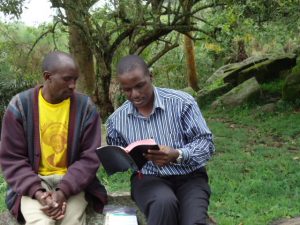2. The Discipline of Intercessory Prayer
I separate this from devotion, not because they are not related, but because intercessory prayer is so much harder than devotion. Devotion is the oil and wine, the joy of communion. The prayer of devotion is praise, adoration, thanksgiving, personal confession and supplication. But intercession is the hard work of a priest. Intercession is more like Gethsemane. It may be our
hardest work. It is long. It is tiring. If you love your people, it can be agonising. But if you neglect it, spiritual apathy will grow.  This is probably the discipline we are most likely to skip, because it is so hard. But we must do it. Set time aside. We read about Epaphras, who was probably the pastor of Colossians: “Epaphras, who is one of you, a bondservant of Christ, greets you, always laboring fervently for you in prayers, that you may stand perfect and complete in all the will of God. For I bear him witness that he has a great zeal for you, and those who are in Laodicea, and those in Hierapolis” (Colossians 4:12-13).
This is probably the discipline we are most likely to skip, because it is so hard. But we must do it. Set time aside. We read about Epaphras, who was probably the pastor of Colossians: “Epaphras, who is one of you, a bondservant of Christ, greets you, always laboring fervently for you in prayers, that you may stand perfect and complete in all the will of God. For I bear him witness that he has a great zeal for you, and those who are in Laodicea, and those in Hierapolis” (Colossians 4:12-13).
Make sure your own soul is nourished, and then pray with your boots on. Keep a list. I agree with Kent Hughes to split the various needs up according to different days. So for example, on day 1, you might pray for unsaved persons, the country and government. On day 2, you might pray for missionaries, fellow pastors, and for revival. On day three you might pray for pressing church needs, personal growth, and current problems. On day four, you might pray for church leadership, upcoming events, the corporate services. Each day you might be praying for your family, for church leaders, for the spiritual growth and protection of your church. If your church is larger, it’s not a bad idea to split the names up alphabetically.
3. The Discipline of Study
No pastor can be a shepherd without extensive reading, study. I am not here to lecture you on the time and method of sermon preparation except to say, keep yourself glued to that chair or on your knees until you have understood the text grammatically, contextually, historically and doctrinally.  Keep yourself glued to that chair until you have considered and worked out the principles applicable to your congregation. Keep yourself glued to that chair until you have worked out helpful illustrations, clear applications, and a gripping introduction.
Keep yourself glued to that chair until you have considered and worked out the principles applicable to your congregation. Keep yourself glued to that chair until you have worked out helpful illustrations, clear applications, and a gripping introduction.
Go beyond sermon preparation. We must be reading what the church has said. We must be reading the greatest works of devotion, church history, biography, theology, practical and topical works on the ministry, preaching and counselling. We must be reading to understand our culture and its various phenomena. That’s a lot of reading. It can only be done with planning, and organisation. Plan your study time. Protect your study time. Have a time when you don’t take phone calls. Make certain hours inviolable. If you work on your computer, settle it that you will not surf the web or check emails or flit from task to task. List books you want to get through in the next year.
4. The Discipline of Pastoral Nurture
I think pastors seem to come in two flavours – bookworms and outdoors types. Some like nothing more than to be locked in a study all day. Some like nothing more than to be out and about, mingling, visiting. If you are the second type, then this discipline will seem like second nature to you, and the discipline of study is probably harder. If you are the studious type, the temptation is going to be to be in your study all day and never be out there as a shepherd. Certainly shepherds feed, but shepherds also tend. They inspect the sheep individually. They clean them, bind up wounds, discipline. Pastors must apply the Word of God to the people of God, not only teach it.
Making the phone calls, visiting the sick, getting into hospitals, having coffee with the men one on one, having Bible studies in your home, having one-on-one discipleship, having people over for lunch or dinner, spending much time after the services speaking to people and talking with them. If you are not this way, you must set up plans and structures to make this happen more often. Make sure you nurture the strong ones. How often we spend our time chasing down the unfaithful, the struggling the weak, assuming the so-and-so who comes to every service is just fine. Meanwhile, they may be wasting away spiritually. Jesus spent his time with twelve, not chasing down everyone on the periphery. Spend most of your time strengthening those who are committed. They will start shepherding others. Spend some time going after the weak and apathetic.
5. The Discipline of Evangelism
 Some men do not need to plan their evangelism, it happens as spontaneously as breathing. On the other hand, many pastors find evangelism hardly happening. They are in their study most of the day, or they are visiting other Christians. If that is you, then you must structure things so as to interact with unbelievers. I would firstly say, make sure you pray for opportunities to witness. Second, keep a list of people attending your church, whose salvation is in doubt. Set up times to meet with them. Third, try to follow up on unsaved contacts that your church gives you. Fourth, if you haven’t already, work on some kind of corporate evangelism that your church can be involved in. Different communities require different approaches. Nevertheless, we should plan it somehow.
Some men do not need to plan their evangelism, it happens as spontaneously as breathing. On the other hand, many pastors find evangelism hardly happening. They are in their study most of the day, or they are visiting other Christians. If that is you, then you must structure things so as to interact with unbelievers. I would firstly say, make sure you pray for opportunities to witness. Second, keep a list of people attending your church, whose salvation is in doubt. Set up times to meet with them. Third, try to follow up on unsaved contacts that your church gives you. Fourth, if you haven’t already, work on some kind of corporate evangelism that your church can be involved in. Different communities require different approaches. Nevertheless, we should plan it somehow.
6. The Discipline of Family Worship & Family time
I would not think that many pastors plan to neglect family worship and family time. But I also don’t think many pastors plan not to. If you don’t plan not to neglect family time, the chances are, it will happen. By family worship, I mean a time together of loving God, learning from Him, speaking to Him, singing to Him. It doesn’t have to be advanced.  It doesn’t have to be long, and when the children are little, it shouldn’t be. Just don’t let it be superficial or empty – kids pick up on that quickly. Try to be consistent – after supper on as many days as you can, or just after breakfast on as many days as you can. Just like your own times of devotion – you can vary the elements, but the point is to have a heart for God together. The point is to have a love for God as a family – not as individuals going their own way. Ministry tends to crowd in as much as you will take, so you must also structure a break. Have a day that your family knows they have you to themselves. Plan some times to be with your wife alone. Take your children on dates. Maintain the family dinner table. Do not let it disintegrate into TV dinners, into the teens being everywhere else. Foster a culture that dinner times are family gatherings. Exceptions can be made, but the rule is gathering together for dinner. Read, read, read to your children.
It doesn’t have to be long, and when the children are little, it shouldn’t be. Just don’t let it be superficial or empty – kids pick up on that quickly. Try to be consistent – after supper on as many days as you can, or just after breakfast on as many days as you can. Just like your own times of devotion – you can vary the elements, but the point is to have a heart for God together. The point is to have a love for God as a family – not as individuals going their own way. Ministry tends to crowd in as much as you will take, so you must also structure a break. Have a day that your family knows they have you to themselves. Plan some times to be with your wife alone. Take your children on dates. Maintain the family dinner table. Do not let it disintegrate into TV dinners, into the teens being everywhere else. Foster a culture that dinner times are family gatherings. Exceptions can be made, but the rule is gathering together for dinner. Read, read, read to your children.
7. The Discipline of Bodily health
We pastors tend to live a sedentary lifestyle. A lot of sitting, and a lot of reading. We might walk short distances here and there, but it is often the case that we get little physical exercise. When we visit we get more coffee than we need, and cakes as well. We are sometimes up late and up early. If we neglect our bodies, not only will this shorten our lifespans’, but it will decrease our usefulness while here. Spurgeon said a pastor filled with depression often simply needs a stiff breeze in his face and a good walk in the woods. Spurgeon says this won’t give grace to the soul, but it will give oxygen to the body, which is next best. Paul says bodily exercise profits a little. He didn’t mean to say it is useless. He was comparing its usefulness to godliness. It does still have some profit. This body needs to be maintained with exercise, decent eating and adequate rest. However you do it, make time for some kind of exercise, even if it is a good walk around your neighbourhood for thirty minutes. Do not think that eating anything is a sign of spirituality. Just because you are a Baptist, does not mean that gluttony is allowed. Food is one area where we sometimes have to deny ourselves something quite lawful to maintain the atmosphere of self-discipline. Continual indulgence in one area, makes it more likely in all other areas. Do not neglect your body’s need for rest, and do not oversleep.

Now I am sure you might chide me for not including some other disciplines – the discipline of giving, or of memorising Scripture, but I am confident you can see where those might fit in under the ones we have listed. A pastor who gives himself to devotion, intercessory prayer, study, pastoral nurturing, evangelism, family worship and bodily health will not have a field overrun by the thorns of spiritual apathy, dryness or ineffectiveness. The thistles of poor family relationships will be less likely, the hard ground of indifferent church members less likely. Solomon said something else. He said, “He who has no rule over his own spirit, is like a city broken down, and without walls”. We know that in the ancient world, a city’s walls were its main defence against enemies. Solomon is saying, the man without discipline is defenceless. Against what? Against all that wars against his soul and his effectiveness. These disciplines are bricks. The Spirit of God is the power on that wall defending you against ruin. If the city of your soul is without the wall of discipline, it will take a miracle to defend you against attacks. The Spirit will not do a
miracle for you when He could have simply used your obedience.
So, pastor, if the man is not Solomon, but the Lord Jesus, and the field is your life – what does He see?
 – David De Bruyn, Professor of Church History, Shepherds’ Seminary Africa
– David De Bruyn, Professor of Church History, Shepherds’ Seminary Africa

